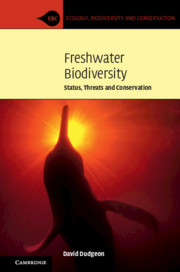Book contents
- Freshwater Biodiversity
- Ecology, Biodiversity and Conservation
- Freshwater Biodiversity
- Copyright page
- Epigraph
- Contents
- Foreword
- Permissions for Epigraphs
- 1 The Freshwater Commons
- 2 Global Endangerment of Freshwater Biodiversity
- 3 Overexploitation
- 4 Alien Species and Their Effects
- 5 River Regulation
- 6 Vanishing Lakes and Threats to Lacustrine Biodiversity
- 7 How Will Climate Change Affect Freshwater Biodiversity?
- 8 Ecosystem Services and Incentivizing Conservation of Freshwater Biodiversity
- 9 Conservation of Freshwater Biodiversity
- Afterword
- References
- Species Index
- General Index
- Plate Section (PDF Only)
4 - Alien Species and Their Effects
Published online by Cambridge University Press: 16 June 2020
- Freshwater Biodiversity
- Ecology, Biodiversity and Conservation
- Freshwater Biodiversity
- Copyright page
- Epigraph
- Contents
- Foreword
- Permissions for Epigraphs
- 1 The Freshwater Commons
- 2 Global Endangerment of Freshwater Biodiversity
- 3 Overexploitation
- 4 Alien Species and Their Effects
- 5 River Regulation
- 6 Vanishing Lakes and Threats to Lacustrine Biodiversity
- 7 How Will Climate Change Affect Freshwater Biodiversity?
- 8 Ecosystem Services and Incentivizing Conservation of Freshwater Biodiversity
- 9 Conservation of Freshwater Biodiversity
- Afterword
- References
- Species Index
- General Index
- Plate Section (PDF Only)
Summary
Overexploitation is a major threat to freshwater biodiversity.It chiefly affects vertebrates, mainly fishes, as well as reptiles, amphibians and a few mammals and birds, but some invertebrates are also subject to human depredation. Most capture is for food, but some species are taken for medicinal reasons, their skins, or for the aquarium trade. Overfishing became evident in Europe over 1000 years ago, when reductions in mean size and abundance of target species became evident. Size reduction in overexploited stocks is typical of non-fish also: this ‘great shrinking’ is a fingerprint of Anthropocene threats to biodiversity, reflecting both a reduction in the average size of individual species and in the mean body size of species making up assemblages.It results in ‘fishing down’ of food chains as smaller and smaller species are exploited in succession, and is evident in large rivers (Amazon, Yangtze, Ganges and Mekong), where it especially affects migratory species, and lakes (Malawi, Victoria).Statistics on freshwater capture yields are generally underestimates.Subsistence fishing contributes much to human welfare, but inadequate data limits fishery management options.
Keywords
- Type
- Chapter
- Information
- Freshwater BiodiversityStatus, Threats and Conservation, pp. 123 - 215Publisher: Cambridge University PressPrint publication year: 2020

